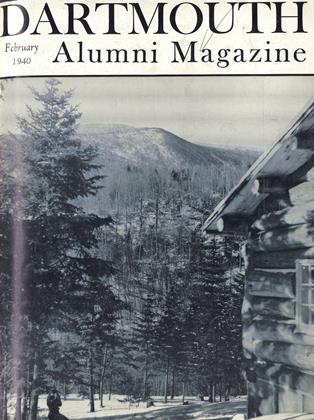A Young Poet with Great Promise Appears In Yale's Younger Poets Series
by Reuel Denney '32Yale University Press, p. 68. $2.00.Reviewed by ALEXANDER LAING '25
TEN'YEARS AGO, in an unacknowledged part of a composite preface to Dartmouth Verse 1930, I expressed the hope that at least one of its authors would some day write "poetry of high importance," with the warning that "one of the seeming lesser voices of today may be the most compelling of all, five years from tomorrow." A seemingly lesser name, Reuel Nicholas Denney, was signed in that book to a poem containing many bad lines and one and a half memorable ones:
—but I have feltMyself a shadow on the wintry planet.
He was then seventeen, a sophomore. Two years later, in a Chapbook called Dartmouth Verse 1922-1932, Denney was represented by two poems as good as have ever been written by a Hanover undergraduate. Both of them, American Ruin and Message Before the First Snow, deservedly are included in his first volume which is also 38th in the Yale Series of Younger Poets.
This book reveals growth and-happily —growing pains in progress. The once wide-eyed viewer of physical surroundings puts more social comment in his lines, yet holds somehow to a thin, chill wisp of hopefulness, startling his pages here and there with raffish joy in the one reliable virtue: the love of an individual man for a chosen companion.
He can put a psychiatric textbook in a line, as when he writes of a decadent town:
—The bedroomFastens the madness of the ancient crimes. and he can generalize the general madness of our days with: Now that the order's broken and the hillLies curving shadow to the bomber's wing. His steadiest excellence appears in recollection, as in The Children, nostalgic with insight, which holds off a sort of jack-knife stab till the last line.
Denney, with plenty to say, is still working out a personal philosophy of expression. The direction of his travel possibly is hinted at in Invocation, which shrewdly ponders the problem of communication in living, everyday speech, while it holds to a disciplined form that makes form itself unobtrusive, as it should be. I should like to know whether The Cromlech, excellently wrought to a strict, repeated pattern, is earlier or later than—for example— Good Wives which is potentially more important but seemingly slipshod. Riming is so minor an aid to poetry, and yet so distracting when arbitrarily misused, that I wonder on what principle it is employed at all in many of these poems. Is it only out of a sense of duty to the formlessness and calculated obfuscation fashionable in the end-of-boom decadence when Denney first was trying his wings?
The serious fault in this book is the tendency to unsound imagery, unhappily most evident in the title poem. A poet concerned only with the quest for fanciful beauty can run aground on the shoals of Bohemia, and nobody cares; but one passionately concerned with social evaluations cannot be trusted as the prophet he might otherwise become if his responsibility to poetic truth seems easy-going. Poetic truth has no connection with prosaic fact. It does not ask that the poet call a yardarm a yardarm, but when he writes of a "well-clewed gleaming yardarm" he is mauling sense without Tightness of fact or symbol. He could call a yardarm a straw, and thereby imply a hurricane in action without having to mention it. He could call it a hook to stretch men's necks, and no-one would think he was describing its contour. But when he spills out jargon without knowledge of its meaning, one is justified in distrusting the validity of more important symbols of a vaguer nature.
This mild spanking is indulged in only because the issue is really important. I do not know of a young poet in the English speaking world who has more promise. Here and there he dams criticism, as in For My Girl's Birthday, a superb poem full of sad, smouldering fury. It is in no way marred by the fact that he has spoken plainly and has held to a stanza form chosen at outset.
 View Full Issue
View Full Issue
More From This Issue
-
 Article
ArticleMore Than Professor
February 1940 By JOHN HURD JR. '21 -
 Article
ArticleThe College In The Sixties
February 1940 -
 Class Notes
Class Notes1915*
February 1940 By CHARLES R. TAPLIN -
 Article
ArticleEducation Without Books
February 1940 By Davis Jackson '36 -
 Sports
SportsBig Green Teams
February 1940 By Whitey Fuller '37 -
 Article
ArticleHanover Browsing
February 1940 By HERBERT F. WEST '22
Books
-
 Books
BooksAlumni Articles
MAY 1969 -
 Books
BooksTHE FRENCH REVOLUTION
February 1933 By Frank Maloy Anderson -
 Books
BooksIT'S EASY TO SKI
January 1937 By Herbert F. West '22 -
 Books
BooksEXETER IN 1830. By William Gilman Perry 1842 M.D. EXETER IN 1776.
FEBRUARY 1973 By JOHN H URD '21 -
 Books
BooksMAKE YOUR OWN MOVIES. (FOR FUN AND PROFIT).
June 1939 By S. C. H. -
 Books
BooksWITH AN EYE ON THE GALLERY.
JANUARY 1967 By TRUMAN H. BRACKETT JR. '55

